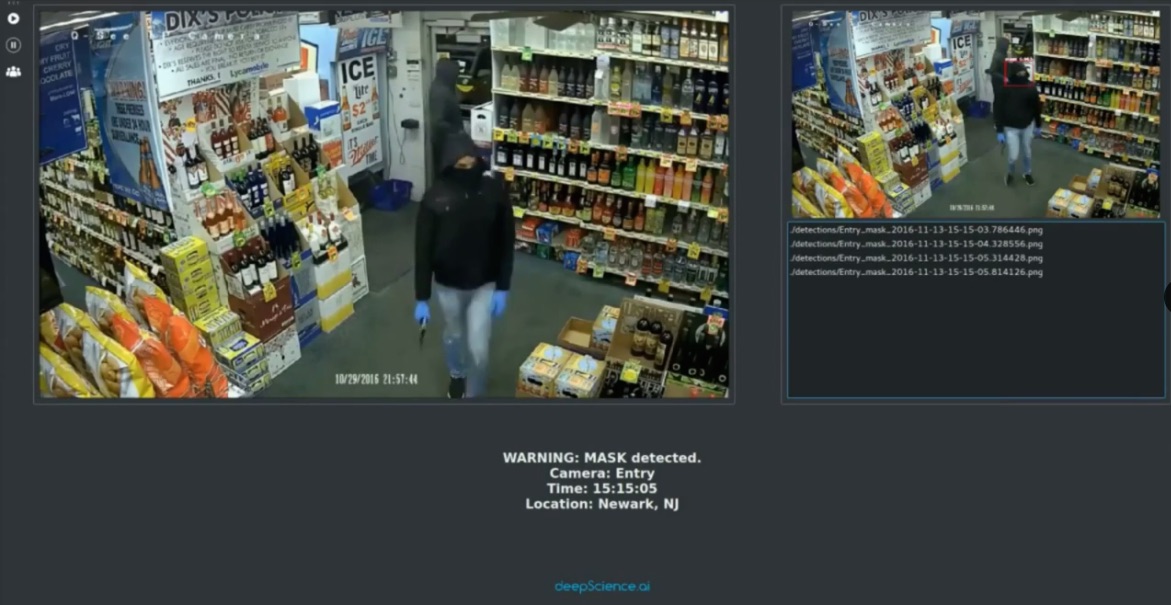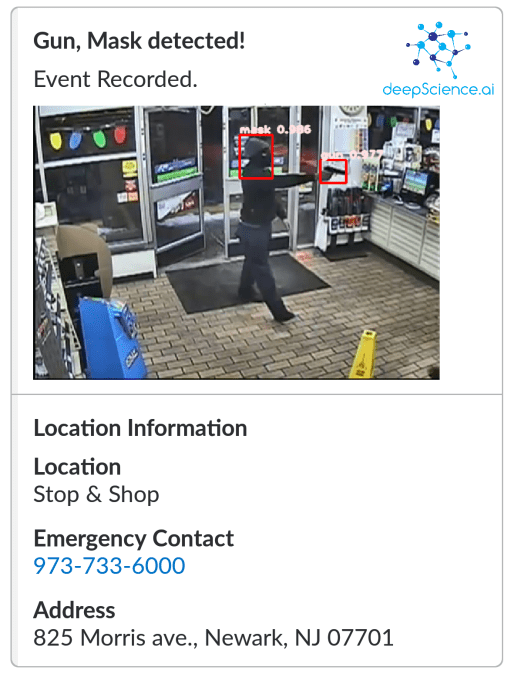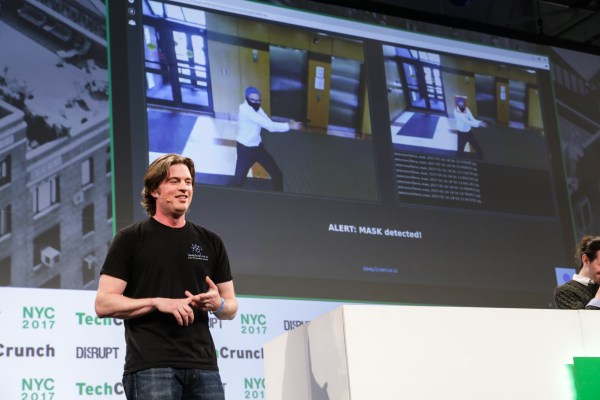You’re working late at the 7-Eleven when a masked man comes through the door with a gun. You raise your hands, follow his instructions, empty the cash register and throw some burners in the bag. As he runs out the door, you note his height, collect yourself and call 9-1-1. Unless you don’t need to because the mask immediately tipped off your store’s AI, and the police are already on their way with a description. That’s what Startup Battlefield company Deep Science AI hopes to enable.
There are security cameras everywhere, founders Sean Huver and Sam Tkach thought, and deep learning models are getting really good at spotting individual objects in footage — for example, masks and guns. So why not put the two together?
“People find it surprising how prevalent this problem is in high-crime areas,” CEO Sean Huver told TechCrunch. “There are 200 robberies like this a day on average, so around 75,000 per year.”
[gallery ids="1491590,1491589,1491587,1491586,1491633,1491632,1491631"]
That makes it a very clear threat for thousands of franchise and mom-‘n-pop bodegas and gas stations throughout the country. But such robberies often go unpunished because they’re generally only reported after the perpetrator has fled, unless someone is always watching the security cam — a costly service.
Deep Science AI is totally bootstrapped and has a straightforward mission: use the tireless analysis capability of AIs to augment human oversight to provide a cheaper and maybe even better way to keep an eye on your store.
 “We’re the first to build a whole platform that can scale up to thousands of cameras, and the first to do a real-world deployment,” Huver said. And at around $2 per camera per day, it’s about 1/10th the price of hiring a human to watch your feeds for you.
“We’re the first to build a whole platform that can scale up to thousands of cameras, and the first to do a real-world deployment,” Huver said. And at around $2 per camera per day, it’s about 1/10th the price of hiring a human to watch your feeds for you.
A great deal of security cameras are IP-based, sending their footage to some data center to be archived or, if they pay for it, monitored. Deep Science’s system sits on that stream and runs it through a set of neural networks trained on thousands of hours of real robberies — and a few fake ones.
 “Obviously you want the data to be as close to the real thing as possible,” Huver said, “but we needed to get some angles that we didn’t see, so we also filmed quite a bit on our own. We have a whole collection of masks and fake guns.”
“Obviously you want the data to be as close to the real thing as possible,” Huver said, “but we needed to get some angles that we didn’t see, so we also filmed quite a bit on our own. We have a whole collection of masks and fake guns.”
The resulting systems do pretty well down to about 30 “pixels on target,” meaning that the gun or face is most confidently detected when it’s that many pixels across in the footage. If one network isn’t quite sure whether something is a gun, the imagery gets sent to a “binary specialist” network that gives a second opinion.
If it looks bad enough, it goes to a human, as an alert in a Slack channel, who can alert the authorities. (If no one responds within a few seconds, it goes to a backup human.)
“We’re at the point where one analyst can deal with about 500 cameras, and they deal with one false positive every 40 seconds or so,” Huver explained. They hope to get that number up to around 800 or 1,000 as the networks improve and the false positive rate drops.
But the company is confident that the system in its current state is more than good enough to deploy. In fact, it’s already deployed in a limited way.
It’s been running in a closed beta for four weeks at 18 locations, which has helped improve their algorithms, and they launched an open beta onstage today, which should expand this to 200 locations.
Sunoco, which runs more than a few gas stations, has expressed interest in joining; large companies like that, you may think, can afford the nicer service. True, but this is cheaper at scale and may prove to be as effective as human monitors. And anything companies can do to improve security and lower their liability is actively pursued — poor security practices tend to leave them open to lawsuits.
Deep Science does have to pay its humans, even if there aren’t many of them, and to that end it is both looking to grow organically and to solicit funding. A member of its board hails from venerable security company ADT, and it may be possible to get into the system of security middlemen who equip and plan deployments for locations. This system would be an upsell, but a cheaper one than 24/7 human monitoring.
Detecting masks and guns is a sort of minimum viable product, but the company doesn’t intend to stop there. Once they’re in the system, there are all kinds of interesting data that can be extracted. Perhaps there’s no gun or mask, but an employee puts their hands in the air. Or maybe a window is broken when no one is around. Or maybe a fire starts, and can be responded to even before the smoke detectors go off.
These and other features will be part of the open beta, so if you’re a small business and this whole AI monitoring thing doesn’t freak you out, head over here to sign up.
